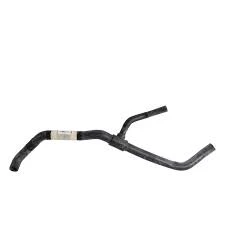car fuel pipe
Sep . 13, 2024 09:36 Back to list
car fuel pipe
The Importance of Car Fuel Pipes
Car fuel pipes may seem like a trivial component of a vehicle's complex system, but they play a critical role in ensuring the efficient operation of an automobile. Fuel pipes are responsible for transporting gasoline or diesel from the fuel tank to the engine, where it is then mixed with air and combusted to produce power. Understanding the importance of fuel pipes can help car owners maintain their vehicles and ensure longevity and performance.
Function and Design
Fuel pipes are typically made from materials that can withstand high pressures and temperatures, such as steel, aluminum, or reinforced plastic. Their design is engineered to prevent leaks, which could lead to dangerous situations, including fires and engine failure. The inner diameter of fuel pipes is specifically calculated to allow a sufficient flow of fuel without causing excessive pressure drop.
Common Issues
Like all components in a vehicle, fuel pipes can face a variety of issues over time. Corrosion, wear, and damage can lead to leaks, which not only waste precious fuel but can also jeopardize the safety of the vehicle. Signs of a faulty fuel pipe include a noticeable change in fuel efficiency, the smell of gasoline, or the presence of fuel spots underneath the vehicle. Regular inspections can help spot problems early, allowing for timely repairs.
car fuel pipe

Maintenance Tips
To prevent issues related to fuel pipes, car owners should follow some essential maintenance tips. First, always use high-quality fuel that complies with the manufacturer’s recommendations. Low-quality fuels can contain impurities that may clog or damage the fuel system, including the pipes. Second, regular engine check-ups can include inspections of the fuel pipes as part of the overall health check of the vehicle. Mechanics can easily identify worn or damaged pipes and recommend replacements before they lead to more significant issues.
Upgrading Fuel Pipes
Performance enthusiasts often consider upgrading their vehicle's fuel pipes as a means to improve engine performance. High-performance fuel pipes made from better materials can increase fuel flow, enhancing power output and throttle response. However, such upgrades should be conducted with caution and ideally under the guidance of a professional to ensure that they are compatible with the rest of the vehicle’s fuel system.
Conclusion
In conclusion, car fuel pipes may not be the most glamorous aspect of vehicle maintenance, but their role is undeniably vital. Regular inspections and maintenance can prevent leaks and other issues, thus avoiding costly repairs and ensuring the vehicle runs smoothly. For anyone who wishes to get the most out of their vehicle, understanding the importance of car fuel pipes should be a priority. Whether it's addressing minor issues or considering performance upgrades, knowledge about fuel pipes is an integral part of vehicle ownership. Ultimately, a well-maintained fuel system contributes not just to performance but also to overall safety on the road.
